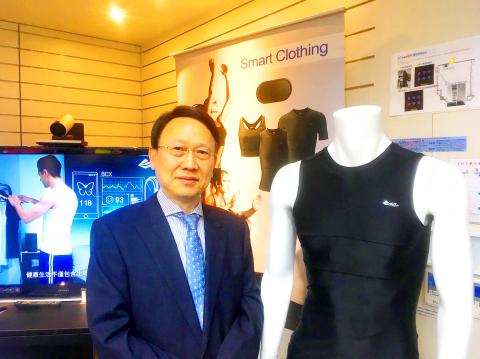Apparel maker Makalot Industrial Co (聚陽) is expanding capacity in Africa and Central America to reach more brand customers, a company executive said yesterday.
“This year, we plan to outsource manufacturing to Lesotho through collaboration with some manufacturers there,” chairman Frank Chou (周理平) told a news conference in Taipei.
The company is also considering setting up its own plants in Africa, Chou said, adding that it would send a team to the continent to evaluate the possibility of further expanding its presence there.

Photo: Chen Jou-chen, Taipei Times
Makalot expects to secure more orders from US clients through the expansion project, he said, citing lower labor costs and possibly zero tariffs due to some African nations’ trade agreements with the US.
The plan to build a manufacturing base in Africa is also expected to attract European clients, given lower transportation costs compared with Southeast Asian nations, Makalot said.
Makalot operates plants in Taiwan, China, Indonesia, Cambodia, Vietnam and the Philippines, company data showed.
The company, which manufactures products for Gap Inc, Kohl’s Corp and Target Corp, is also tapping markets in Central America to further strengthen its position in the supply chain of US apparel brands.
The firm said it would begin manufacturing products in Guatemala in the fourth quarter of this year at the earliest.
Makalot gave a relatively positive business outlook for this year, saying it expects the local currency’s fluctuations to have less impact on its operations.
Volatile foreign exchange rates remain a risk to the company, but the appreciation of the New Taiwan dollar should not be as drastic as last year, Chou said.
The NT dollar last year rose 8.14 percent against the US dollar, putting significant pressure on Taiwan’s export-reliant manufacturers.
Makalot posted revenue of US$736 million for last year, representing a 7 percent year-on-year increase.
However, in NT dollar terms, full-year sales only gained 1.12 percent to NT$22.38 billion (US$763.35 million), company data showed.
Makalot used the news conference to showcase its latest smartwear products featuring graphene applications, which are expected to drive sales growth and sustain its profitability for the next few years.
The company has been working on the product with Singular Wings Medical Co (奇翼醫電), a Hsinchu-based healthcare solution provider, for more than two years, it said.
Graphene, a material with better biocompatibility, can help devices detect and track the electrical activity of wearers’ hearts more accurately, Singular president David Lee (李維中) said on the sidelines of the gathering.
Makalot is ready for commercial production, a company official told the Taipei Times, but declined to provide a timetable.
The company said it plans to spend about NT$100 million on the research and development of smartwear-related projects this year.

In Italy’s storied gold-making hubs, jewelers are reworking their designs to trim gold content as they race to blunt the effect of record prices and appeal to shoppers watching their budgets. Gold prices hit a record high on Thursday, surging near US$5,600 an ounce, more than double a year ago as geopolitical concerns and jitters over trade pushed investors toward the safe-haven asset. The rally is putting undue pressure on small artisans as they face mounting demands from customers, including international brands, to produce cheaper items, from signature pieces to wedding rings, according to interviews with four independent jewelers in Italy’s main

Japanese Prime Minister Sanae Takaichi has talked up the benefits of a weaker yen in a campaign speech, adopting a tone at odds with her finance ministry, which has refused to rule out any options to counter excessive foreign exchange volatility. Takaichi later softened her stance, saying she did not have a preference for the yen’s direction. “People say the weak yen is bad right now, but for export industries, it’s a major opportunity,” Takaichi said on Saturday at a rally for Liberal Democratic Party candidate Daishiro Yamagiwa in Kanagawa Prefecture ahead of a snap election on Sunday. “Whether it’s selling food or

CONCERNS: Tech companies investing in AI businesses that purchase their products have raised questions among investors that they are artificially propping up demand Nvidia Corp chief executive officer Jensen Huang (黃仁勳) on Saturday said that the company would be participating in OpenAI’s latest funding round, describing it as potentially “the largest investment we’ve ever made.” “We will invest a great deal of money,” Huang told reporters while visiting Taipei. “I believe in OpenAI. The work that they do is incredible. They’re one of the most consequential companies of our time.” Huang did not say exactly how much Nvidia might contribute, but described the investment as “huge.” “Let Sam announce how much he’s going to raise — it’s for him to decide,” Huang said, referring to OpenAI

The global server market is expected to grow 12.8 percent annually this year, with artificial intelligence (AI) servers projected to account for 16.5 percent, driven by continued investment in AI infrastructure by major cloud service providers (CSPs), market researcher TrendForce Corp (集邦科技) said yesterday. Global AI server shipments this year are expected to increase 28 percent year-on-year to more than 2.7 million units, driven by sustained demand from CSPs and government sovereign cloud projects, TrendForce analyst Frank Kung (龔明德) told the Taipei Times. Demand for GPU-based AI servers, including Nvidia Corp’s GB and Vera Rubin rack systems, is expected to remain high,